
Albers Brief Fall 2019
The Entrepreneurship Issue
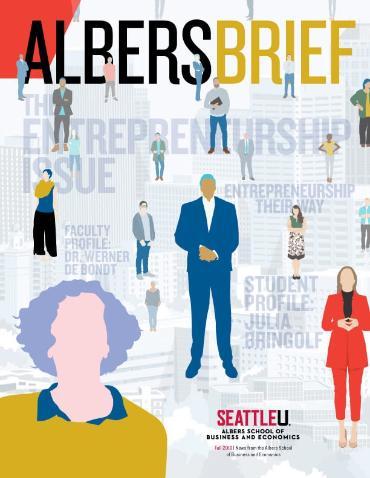
Cover illustration by Ty Pollard
Dean's Message
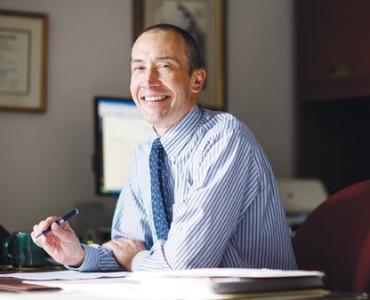
Albers Dean Dr. Joe Phillips
This edition of the Albers Brief focuses on entrepreneurship, a theme which we felt was both timely and relevant.
Entrepreneurship is most often associated with startups. In this issue, we feature three homegrown, rapidly expanding startups: Vera Whole Health, Eldergrow and React Mobile. The seeds of each of these businesses were planted in Albers classes and our annual Harriet Stephenson Business Plan Competition.
Entrepreneurship is also about responsible stewardship of a legacy. An example would be grad student Julia Bringolf, who talks about how her MBA education will prepare her for running her family business.
Royal Bluff Orchards, an organic apple and cherry farm in Royal City, Washington, was founded by her father 37 years ago. Her challenge, she says, is how to evolve the business for the future, when mechanization and automation will impact the agricultural space.
It’s incredibly gratifying that the school has played a small part in the success of our students and the businesses they create, inherit or manage. Do follow us on social media as we continue to share their stories and the positive change they effect, in business and beyond, everyday.

Joseph M. Phillips
Dean, Albers School of Business and Economics
Albers Alumni Crab Feed: Going Strong for 18 Years
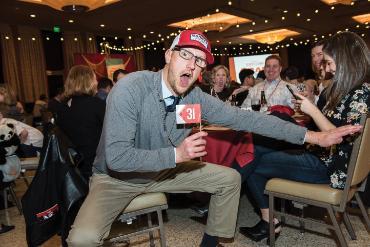
Auction action at the Crab Feed
Started in 2002 by the Albers Alumni Board, a small and committed group of alumni, the Albers Alumni Crab Feed has grown to be the school’s signature alumni event.
Every spring, 250 alumni reunite with each other and some of their favorite faculty, while enjoying a silent auction, exciting games, and a family-style Dungeness crab feast with all of the buttery trimmings.
Proceeds from the event directly benefit Albers students by providing critical scholarship funds, empowering the next generation of ethical business leaders. In 2019, $100,000 was raised, bringing the recently established scholarship endowment value to over $175,000.
The Crab Feed is a highly valued event by the Albers alumni community and is the largest alumni event that is held on campus. The next Crab Feed is scheduled for April 3, 2020.
Sponsorship opportunities are available for companies of all sizes as a way to show your company’s community support, all while having fun with colleagues. Sponsors receive a table at the Crab Feed and are invited to a pre-Crab Feed exclusive networking event, with first access to silent auction items. Tickets go on sale December 6th.
To find out more about sponsorship opportunities, contact Wendy Kelley or call 206-296-2277.
Student Profile: Julia Bringolf
Taking the Family Business to the Next Level
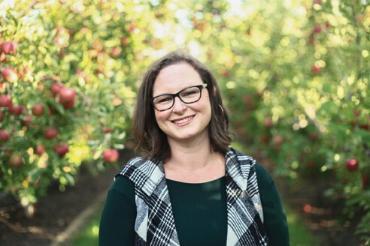
Julia Bringolf: 'I want to be a good steward of what is entrusted to me.'
When entrepreneurship is not about starting a new business, but about growing a legacy
‘Agriculture is exciting!’ is not a phrase you hear often, but if you do, it’ll most likely be uttered by Professional MBA student Julia Bringolf.
The mother of two sees her MBA education as an important tool for the future running of her family’s business, Royal Bluff Orchards. Started by Bringolf’s father, James H. Jackson, 37 years ago in Royal City, Washington, RBO primarily produces high-quality organic apples with a small amount of organic cherries.
Jackson majored in forestry, then got his MBA specializing in accounting and became a licensed CPA, setting up his practice in West Seattle. ‘My father has always had a dual career,’ explains Bringolf. ‘When it came to the orchard he was able to exercise his forestry knowledge while his accounting skills were used to manage the operations on a financial level.’
Jackson’s unique combination of talents was used to expand the business – Royal Bluff was one of the first farms in Washington to raise private equity to grow operations. According to Bringolf, RBO operated across 75 acres for 30 years; In 2013 operations have steadily grown to 500 acres at present.
Produce is consigned through different packinghouses who then sell the fruit to the Safeways and Costcos of this world. In 2018, Royal Bluff grew six million pounds of apples. This only represents a portion of production; currently 200 acres have non-producing trees. At full production, Royal Bluff Orchards will grow approximately 22 million pounds of organic apples.
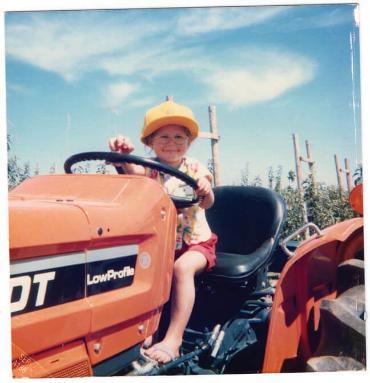
Julia as a child, on the family tractor
Bringolf’s journey in joining the family business was circuitous. A theology graduate of Seattle University, she had envisioned a career of non-profit work which she did for several years before getting married and starting a family with her husband, Christian.
Her first inkling that she enjoyed business was helping in the formation of her husband’s private mental health counseling practice. Within years of starting that practice, she went on to aid in the growth and transition to a group practice, adding several partners.
During this time, with two small kids at home, she started working for her family orchard helping with projects to help ends meet at home. 'I struggled with direction and needed a job I could do from home while my kids were so young. Working with my dad in the agricultural space was really enjoyable. I quickly became interested in the direction he was taking Royal Bluff and wanted to be a part of it, however that looked. I spent three years learning, asking questions, and taking on every project that was appropriate.'
Around 2016 the topic of succession became a common one around the family dinner table. ‘After a lot of consideration (and prayer) I told him I was interested in pursuing it [a long term career with RBO] but that there was a lot I didn’t know. My dad said, great -- you need an MBA. Literally, the next day, I got my GMAT materials and studied for the next six months.’
According to her, the MBA program has been enlightening and confidence-boosting. ‘My dad was blown away by how quickly I understood concepts. Every step of the way, my confidence and aptitude just continued to grow. I blew myself away!’
Last year, Bringolf led her team to the finals in the Harriet Stephenson Business Plan Competition with an idea to create an apple brandy distillery which will be an offshoot of Royal Bluff.
‘Ten per cent of our fruit can’t be sold because of defects,’ she explains. ‘In the past it’s gone to apple juice where we get pennies on the dollar. So we’re making a brandy with this fruit where we can expect to see a higher profit per pound.’
Christened Cash Butte Distillery, the business plan is now a reality. The first batch of brandy is now aging, with the aim of releasing it in two years. By that time, Bringolf will have graduated from the MBA program and will be spending half her time creating a market for the brandy. The other half of her time will be spent helping to run the orchard.
As her capstone, Bringolf is writing a research paper on how automation will affect labor in the state of Washington in tree fruit orchards, particularly apples. She said that while mechanization and automation raise fears of labor replacement, they also represent opportunities for the agricultural space.
‘What I’m trying to do is gain an understanding of how these advances will affect the face of agriculture and how I can be prepared to adopt that technology responsibily with our community and the communities we serve.’
All this is in preparation for her future, and the future of RBO. Her father, Jackson, retired from his CPA practice five years ago and is now full-time with Royal Bluff. Bringolf said he still has certain benchmarks he wants to meet and accomplish before Bringolf has the opportunity of executive leadership, and that there are aspects, like raising capital, that he still wants to head up.
Right now, Bringolf’s official job title is Executive Assistant, working part time while finishing her program. She does everything required on an executive level, from project management, to investor relations and attending capital raising events. Once she goes full-time post-graduation in 2020, she’ll take on a full time role in operations assisting the controller as well as growing the distillery.
‘This education has helped lay an important foundation for my new role. Now, I know what it takes, I feel more confident about what the future holds,’ she says.
‘I want to be a good steward of what is entrusted to me.’
Entrepreneurship Their Way
Entrepreneurship can mean different things to different people. We asked three Albers alumni about their entrepreneurship experience, viewed through the lens of the successful businesses they built.
Vera Whole Health: Fulfilling that BHAG (Big, Hairy, Audacious Goal)
Ryan Schmid is co-founder, president and CEO of Vera Whole Health, a national leader in advanced primary care. Its model is uniquely designed to help people achieve optimum social, psychological and physical well-being – an outcome that’s neither probable nor affordable within the current sick-care system. Schmid earned his MBA at Albers in 2007.
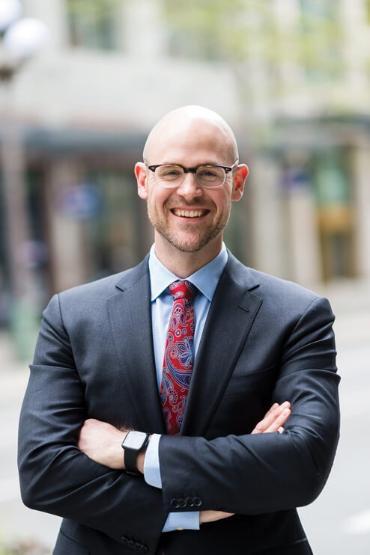
Vera Whole Health's Schmid: 'Don't fall victim to Instagram society.'
Define entrepreneurship.
Bringing an idea to life.
Where do you see the business in five years?
We’ll be coast to coast for sure. I would imagine five years from now, we’ll have made significant progress. I think, on the whole, healthcare is starting to shift towards value and growing awareness of what primary care brings.
Advanced primary care is more than just fixing disease and infirmity. The physical condition can often be a by-product of psychosocial health.
Healthcare extends beyond the four walls of a health center. We’ll be drivers of that, and we’ll find ourselves in more and more larger channel partnerships that expand to benefit from advanced primary care in a higher functioning way.
What keeps you up at night?
What I worry about changes with the seasons. At a macro level, we as a country are so bad at buying healthcare. Even if you’ve got a crystal-clear pathway to better outcomes with less money, the whole system is still rigged. We’re just addicted to sick care and that’s a real challenge to overcome.
On a micro level, we’re at a scenario where Vera is going to double in the next two years. We’ve been around 11 years. Our existential threat went from ‘can we sell enough?’ to ‘can we execute on the scale we want?’. Now it’s all about execution.
What keeps you going?
I oftentimes reflected on what it was that kept me going because the first four years were brutally difficult.
We started in March 2008. The recession set in, and we lost 40% of our revenue. It was very hard to just stay afloat. At multiple points, my closest advisors were suggesting to me that we shut the company down and contain the damage.
I chose not to do that. We have a BHAG (Big Hairy Audacious Goal) that every American would have access to a Vera Whole Health care team. Our vision is to create a health revolution.
What keeps me going is that we’ve got a lot of work to do and we’re on the right trajectory.
What insights and lessons would you share with aspiring entrepreneurs?
Maybe I’m speaking to myself as a student, but don’t fall victim to Instagram society.
We’re constantly inundated with images and stories of glamor and success, stories of the latest unicorn company. The fact of the matter is, the overwhelming majority went through a lot of time and struggle before they became unicorns.
It’s a long hard slog to be where we (Vera) are at today. I think people who want to be entrepreneurs give up prematurely or shouldn’t get into it in the first place if they’re not willing to grind it out. It takes a massive commitment.
Whether you go about entrepreneurship up front or from the side of your desk, you’re going to be confronted with an overwhelming struggle that you’ve got to commit to. The flipside is that you experience the incredible joy that comes with building a business.
Finish this sentence: ‘I knew I had made the right decision on being an entrepreneur when I …’
Can’t imagine doing anything else other than this.
Eldergrow: Committed to making an impact
Orla Concannon is the founder of Eldergrow, a startup that provides innovative gardening products and services for elders living in residential and nursing care. Eldergrow is driven by two innovative, therapeutic horticulture programs that feature mobile, indoor gardens which provide residents with renewed purpose.
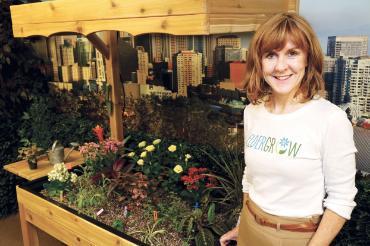
Eldergrow's Concannon: 'You need a whole lot of heart to succeed.' Photo by Charles Elllis
Now in 20 states and over 150 communities on the continental US, Eldergrow continues to provide elders with more meaningful connections to nature. Orla earned her Healthcare Leadership Executive MBA at Albers in 2015 and launched Eldergrow the same year.
Define entrepreneurship.
Making a dream a reality.
Where do you see the business in five years?
Right now, we’re in 20 states in four years, so I expect that we would be nationwide. I’d also like to develop different products and services; explore new industry sectors.
What keeps you up at night?
When I first started, I was scared and wondering if I was making the right step, but I was committed. Some people questioned my choice to start a business from scratch when I had just earned an MBA in the healthcare leadership program.
But thankfully, Seattle University really imprinted my desire to make an impact on our community of elders and gave me the confidence to go out and try.
What keeps you going?
Same thing: I am really committed to making an impact on our elders and improving their quality of life. I am not deterred, four years into it. It’s a mission.
What insights and lessons would you share with aspiring entrepreneurs?
There must a be a true sense of passion wrapped around the dream. It’s not all about business. When people walk away [from a business], it’s after a year or two and you need determination and commitment. You need a whole lot of heart to succeed.
Finish this sentence: ‘I knew I had made the right decision on being an entrepreneur when I …’
Saw the impact that I was making on our elders in senior living settings. I saw firsthand, during our first pilot, how the residents’ faces lit up when they saw their gardens.
I remember working with a group of residents early on. We took baby spider plants and repotted them into small cups. At the end of class, I shared some labels where they could write the names of their plants and stick them onto the cups.
I asked them, ‘What would you like to name your baby plants?’ And these were the names they chose: Hope. Life. Sweetheart. I knew then, in that moment, that Eldergrow was working.
React Mobile: Culture > Strategy
Robb Monkman is founder and CEO of React Mobile, a global leader in providing best-in-class panic button solutions for the hospitality industry. Its safety system is used by some of the largest hospitality brands in the world. Monkman earned his MBA at Albers in 2008.
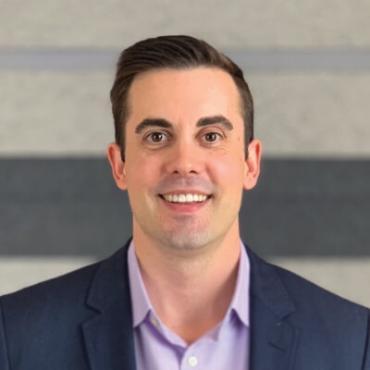
React Mobile's Monkman: 'The difference between good and bad stress is great, and we've got the good kind of stress.'
Define entrepreneurship.
Where to start? Very few people are suited to entrepreneurship. There are certain traits that are permission to play as an entrepreneur. Passion, intelligence and a great idea are only the beginning. If I had to pick one trait that got me this far, it was pure perseverance.
Where do you see the business in five years?
We’re hyper-focused on hospitality from a business perspective. Looking beyond 2020 we want to focus on verticals where we have customers, such as universities and healthcare. We’ve done a lot of work with large companies to help protect their employees.
What keeps you up at night?
It’s always different and shifting. Currently we are delivering on our promises to our customers and making sure they’re happy. What keeps me up now is meeting the overwhelming demand for our product, which is a good problem to have.
What keeps you going?
Sheer excitement and adrenaline. The team is incredible. We have attracted and retained great talent, and work with people I trust, respect and learn from. Our traction is very exciting. We all know where we’re going, we’ve got a plan to get there, and we work together to overcome hurdles. The difference between good and bad stress is great, and we’ve got the good kind of stress.
What insights and lessons would you share with aspiring entrepreneurs?
One: There’s nothing that replaces actual customer feedback. There are many great ideas and business plans but they fail without feedback. Create a minimum viable product that you can get into the hands of potential customers to get feedback. A lot of people are afraid to put their idea out there, but you must in order to find out whether it will work. In many cases, making a slight pivot would help.
Two: Culture is so important. Having a shared vision and having people share behaviors and values – that’s what drives the business once you get out of survival mode. Culture > Strategy.
Finish this sentence: ‘I knew I had made the right decision to become an entrepreneur when I …’
Realized that I had put my dream out there and that there were others who saw my idea and, in many ways, it became their idea. That’s when the idea grew and took on a life of its own. When I saw that and how others were passionate about it and the contributions they made, I knew I had made the right choice.
Alumni Profiles: How Two Alumni are Making a Difference
Albers’ alumni have been actively giving back to the school in recognition of how it has shaped their lives for the better. Two who are keen to share their Albers experience with the less fortunate chose unique ways to pledge their support.
Reuben Butler
BA Business Administration, Finance, 2000
‘It feels good to be able to give back, 20 years removed, and have an impact on lessening the financial burden of students today.’
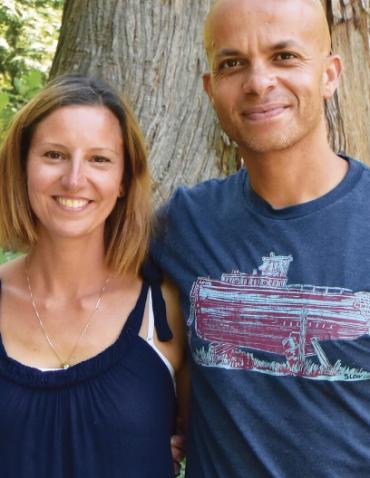
Butler, pictured with wife Meagan, said retired professor David Carrithers helped him see his strengths
When Reuben Butler was considering which school in Seattle to attend, he chose SU because it was more intimate, flexible and provided the access to faculty and resources that he wanted to have.
He quickly got to know every single one of his professors and developed strong relationships with some of them, even beyond graduation.
One such professor was David Carrithers, who Butler said was not only amazing in the classroom, but was instrumental in making connections for Butler to get his first job out of school. That first job has led to a successful career – Butler is now Managing Director of Corporate Development for investment management firm Parametric.
According to him, Carrithers helped him see his strengths, which gave him the ability to enter his career with excitement and confidence. Butler’s SU experience was so positive and instrumental in setting his path that he elected to give a gift supporting scholarships for Albers students in honor of Carrithers, who retired in 2018.
Butler, who received a scholarship himself while studying at SU, says he continues to lean on his education, particularly the messages he was taught around the human component of a career. ‘The faculty stressed the importance of working with people and getting along with others, and they modeled it everyday,’ he says.
‘I carry that forward in my work life and it has served me well.’
Deacon Mike Daniels
BA, Business Administration, 1970
‘I was transformed into the man I am.’
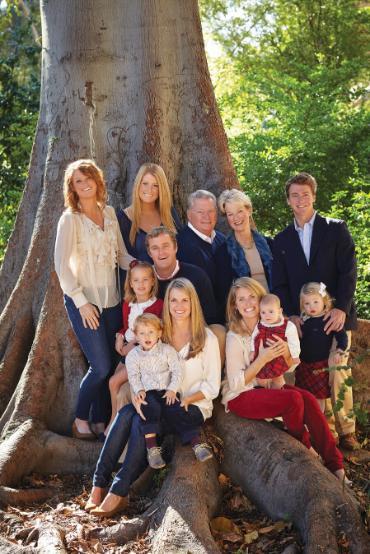
Daniels with his family: 'Seattle U was a miracle in my life.'
Deacon Mike Daniels knew the moment he stepped onto the campus in 1966 that it was the right choice for him to get his undergraduate business degree.
Daniels’ long career was in retail, including Macy’s and a small family retail company. What he learned at SU, he says, was far more valuable than just skills to prepare him for his chosen work. Throughout his time on campus, he learned how to be a well-rounded human being and ‘a person for others’. He says this changed him from being selfish and inward-looking to someone who sought ways to give back and make his communities stronger.
The seed of philanthropy was started by Daniels’ father and blossomed while he was at SU. He and his wife Linda have since built a family culture of giving back by helping the impoverished get an education. The couple passionately believes that education is the answer to ending poverty, helping not only the child but the generations that follow.
The Daniels family has chosen to continue their legacy by creating an endowment as part of their estate plan. It will support Seattle University students who otherwise couldn’t afford to continue their SU education.
‘Seattle U was a miracle in my life,’ Daniels concludes. ‘We are honored to create this gift that will give to future students in perpetuity.’
There are various ways to help the next generation of students get the most out of their Albers experience. Contact Wendy Kelley or call 206-296-2277 to start a conversation.
You can also give online.
Two Albers' Grad Programs Now Available Online
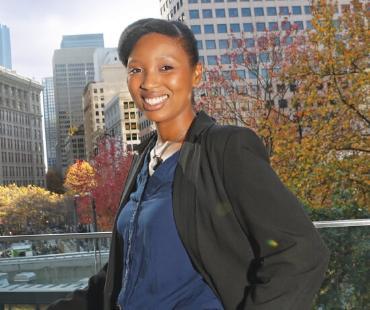
Albers' online programs: Flexible scheduling, four annual opportunities to start, and an immersive learning experience
Albers’ first online graduate business programs kicked off this fall. The Online MBA (OMBA) and Online Master of Science in Business Analytics (OMSBA) programs were designed to help students grow personally and professionally without having to step away from their current roles, wherever they may live.
Both degrees offer flexible scheduling, four annual opportunities to start, and an immersive learning experience via a powerful, intuitive digital learning management system.
Along with a dedicated Student Success Coordinator and 24/7 tech support, the programs allow students to complete coursework anytime, anywhere while benefiting from the quality education that Albers has always offered.
There is no application fee for Albers alumni who wish to apply for either program. More details about our online programs can be found here.
Faculty Profile: Werner F.M. De Bondt
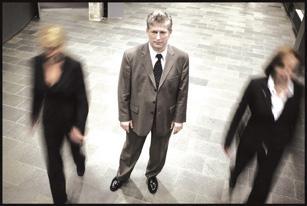
Werner F.M. De Bondt. Photo courtesy of ncr.nl
Dr. Werner De Bondt from Chicago’s DePaul University has been appointed the Thomas F. Gleed Endowed Chair of Business Administration for 2019-20.
De Bondt is the Founding Director of the Richard H. Driehaus Center for Behavioral Finance at DePaul. Earlier (1992-2003), he was the Frank Graner Professor of Investment Management at the University of Wisconsin-Madison. Over the years, he has also taught at universities in Belgium, The Netherlands and Switzerland.
De Bondt is a luminary in the field of behavioral finance and one of its founders, studying the psychology of investors and financial markets. His publications have appeared in top journals such as the Journal of Finance, the Review of Financial Studies and the American Economic Review. He is a frequent speaker to academics and investment professionals around the globe.
His PhD is from Cornell University (1985). In addition, he holds master’s degrees in business administration from the Catholic University of Louvain (Belgium), in public administration from Cornell University, and commercial/industrial engineering from the University of Antwerp (Belgium).
Help an Albers Grad Succeed!

You Know the Quality of An Albers Degree
Why not hire someone with the same strong business background and commitment to service that helped you succeed?
With an Albers graduate, you will get a dedicated employee who will become a leader not only in your organization, but also in your community. Two ways to hire Albers talent:
- Post job and internship opportunities. We'll get the word out to our students about what you're looking for in a successful candidate.
- Participate in Career Fairs. Build your talent pipeline -- and your employer brand -- by engaging with prospective new hires.
Happening at Albers
Albers Executive Speaker Series
Events are held in Pigott Auditorium from 5:30-6:30 p.m. (unless otherwise posted). Free and open to the public.
Mark Mader
President & CEO, Smartsheet
Tuesday, November 19, 2019
Rajeev Singh
CEO, Accolade
Wednesday, January 22, 2020
Manny Medina
CEO and Co-Founder, Outreach
Thursday, February 27, 2020
Albers Career Center Events
Albers Career Night
Networking reception for undergrads to connect with employers and Albers alumni.
Tuesday, February 25, 2020
6-7:30 p.m.
Optimism Brewery, Capitol Hill
SU Career & Internship Fair
Tuesday, February 11, 2020
11 a.m.-2 p.m.
Campion Ballroom
Alumni, please let us know if your company would like to recruit Seattle U students and we’ll get you plugged into our Career Fair. Also, if your company is already attending, we hope you will be able to attend as a company representative to connect with students.
Need more info on these Albers Career Center events or help with career advising? Contact the Albers Career Center or call 206-296-5687.
Innovation & Entrepreneurship Center
The IEC is an active business gymnasium that accelerates ‘fit for the future ‘ SeattleU students so they can apply entrepreneurship theory and innovation to solve real-life problems, launch new ventures that reflect their core values, interests and talents, and advance the common good through social entrepreneurship and business innovation.
The Harriet Stephenson Business Plan Competition – Applications due
Sunday, January 19, 2020
Founder Friday
A casual after-hours gathering where successful business founders share entrepreneurship advice and guidance
Friday, January 24, 2020
4:30 p.m.
Location to be announced
To participate in or find out more about the IEC and its activities, email Amelia Marckworth.
Graduate Program Information Sessions
We hold information sessions for the Professional MBA, Bridge MBA, and Master of Accounting, Business Analytics, and Finance programs monthly throughout the year. Visit the Grad news page for upcoming dates.